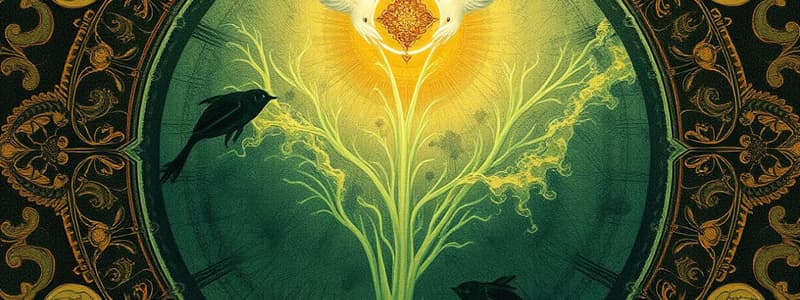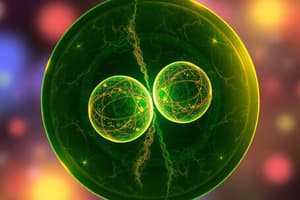Podcast
Questions and Answers
Each chromosome is made up of two strands called chromatids held by a button-like structure. What is this structure called?
Each chromosome is made up of two strands called chromatids held by a button-like structure. What is this structure called?
- Centromere (correct)
- Centrosomes
- Centropode
- Centriole
During which stage in mitosis do the spindle fibers form?
During which stage in mitosis do the spindle fibers form?
- Interphase
- Anaphase
- Metaphase
- Prophase (correct)
Which stage of meiosis is characterized by the separation of sister chromatids?
Which stage of meiosis is characterized by the separation of sister chromatids?
- Prophase I
- Anaphase II (correct)
- Anaphase I
- Prophase II
What type of cell division process results in gametes with half the number of chromosomes?
What type of cell division process results in gametes with half the number of chromosomes?
Which of the following is NOT an application of mitosis?
Which of the following is NOT an application of mitosis?
What is the primary function of mitosis?
What is the primary function of mitosis?
During which stage of mitosis do chromosomes line up in the middle of the cell?
During which stage of mitosis do chromosomes line up in the middle of the cell?
Which of the following best describes meiosis?
Which of the following best describes meiosis?
What happens during telophase of mitosis?
What happens during telophase of mitosis?
Which statement correctly contrasts mitosis and meiosis?
Which statement correctly contrasts mitosis and meiosis?
What term is used for the process of the division of the nucleus?
What term is used for the process of the division of the nucleus?
What is one of the significant roles of meiosis?
What is one of the significant roles of meiosis?
What structure connects spindle fibers to chromosomes during cell division?
What structure connects spindle fibers to chromosomes during cell division?
Flashcards are hidden until you start studying
Study Notes
Cell Division Overview
- Mitosis produces two genetically identical daughter cells, each with the same chromosome number as the parent cell.
- Meiosis generates four genetically diverse daughter cells, each with half the chromosome number of the parent cell.
- Mitosis occurs in somatic (body) cells; meiosis occurs in gamete (reproductive) cells.
Stages of Mitosis
-
Prophase
- Chromosomes condense and coil.
- Nuclear envelope breaks down.
- Spindle fibers start forming.
-
Metaphase
- Chromosomes align at the cell's equator.
- Spindle fibers attach to chromosomes at the centromeres.
-
Anaphase
- Sister chromatids are pulled apart to opposite poles.
-
Telophase
- Chromosomes decondense and uncoil.
- Nuclear envelopes reform around each set of chromosomes.
- Spindle fibers disassemble.
Stages of Meiosis
-
Meiosis I
- Homologous chromosomes separate, leading to two cells with half the chromosome number.
-
Meiosis II
- Sister chromatids separate, resulting in a total of four haploid cells.
Key Differences
- Mitosis is a single division resulting in two cells; meiosis involves two divisions resulting in four cells.
- Mitosis maintains chromosome number; meiosis halves chromosome number, promoting genetic diversity.
Significance of Mitosis
- Critical for growth and development of an organism.
- Aids in the repair and replacement of damaged cells.
- Used in asexual reproduction processes.
Importance of Meiosis
- Facilitates sexual reproduction in diploid organisms.
- Promotes genetic variation through independent assortment and crossing over.
- Assists in repairing genetic defects via genetic exchange.
Common Errors in Cell Division
- Cell division is not a flawless process; errors can lead to issues such as cancer.
Assessment Questions
- Key terms associated with cell division:
- Cell cycle refers to the series of changes a cell undergoes from formation to division.
- Karyokinesis is the division of the nucleus.
- Chromatin refers to long, thread-like DNA in non-dividing cells.
- Somatic cells are body cells.
- Interphase is the resting stage before mitosis.
Characteristics of Plant vs Animal Cells in Mitosis
- Plant cells form a cell plate during cytokinesis, while animal cells undergo cleavage furrow formation.
Cancer and Cell Division
- Cancer occurs when cells undergo uncontrolled growth and can spread to other body parts.
- Mitosis applications exclude the production of gametes, which is a function of meiosis.
Studying That Suits You
Use AI to generate personalized quizzes and flashcards to suit your learning preferences.



